Key CRM Features to Look for in CRM Software
In today’s world, where personalized customer interactions are the cornerstone of business success, CRM systems have become essential tools for organizations across all industries. These systems are at the core of effective customer engagement, helping businesses create lasting relationships, and drive sales.
However, with all the available CRM solutions on the market, it’s crucial to understand the key features that differentiate an exceptional CRM from the rest. In this article, we will go over the most important CRM features you should pay attention to when you’re looking for the best solution for your business.
20 Most Important CRM Features
CRM platforms offer plenty of different features, but in that case, more is not always better, and having too many features might do more harm than good. Additional functionality might drive up costs and make the system overly complicated for its users. It’s crucial to choose features that will empower customer-related operations without overburdening the user. In this section, we describe the key CRM functionality, identifying features that are essential to effective customer relationship management.
From contact management to analytics and reporting, we characterize the tools that help organizations build connections, streamline processes, and gain valuable insights into their customer base and operations.
Contact & accounts management
CRM software offers practical tools to organize, track, and enhance customer relationships. It helps businesses create a 360-degree customer profile that typically includes contact and business information, current engagement status and activities, customer preferences, and previous interactions with the company. Access to all this information, across the whole company, enables businesses to engage with their customers on a more personalized level at the right time and through their preferred channels.
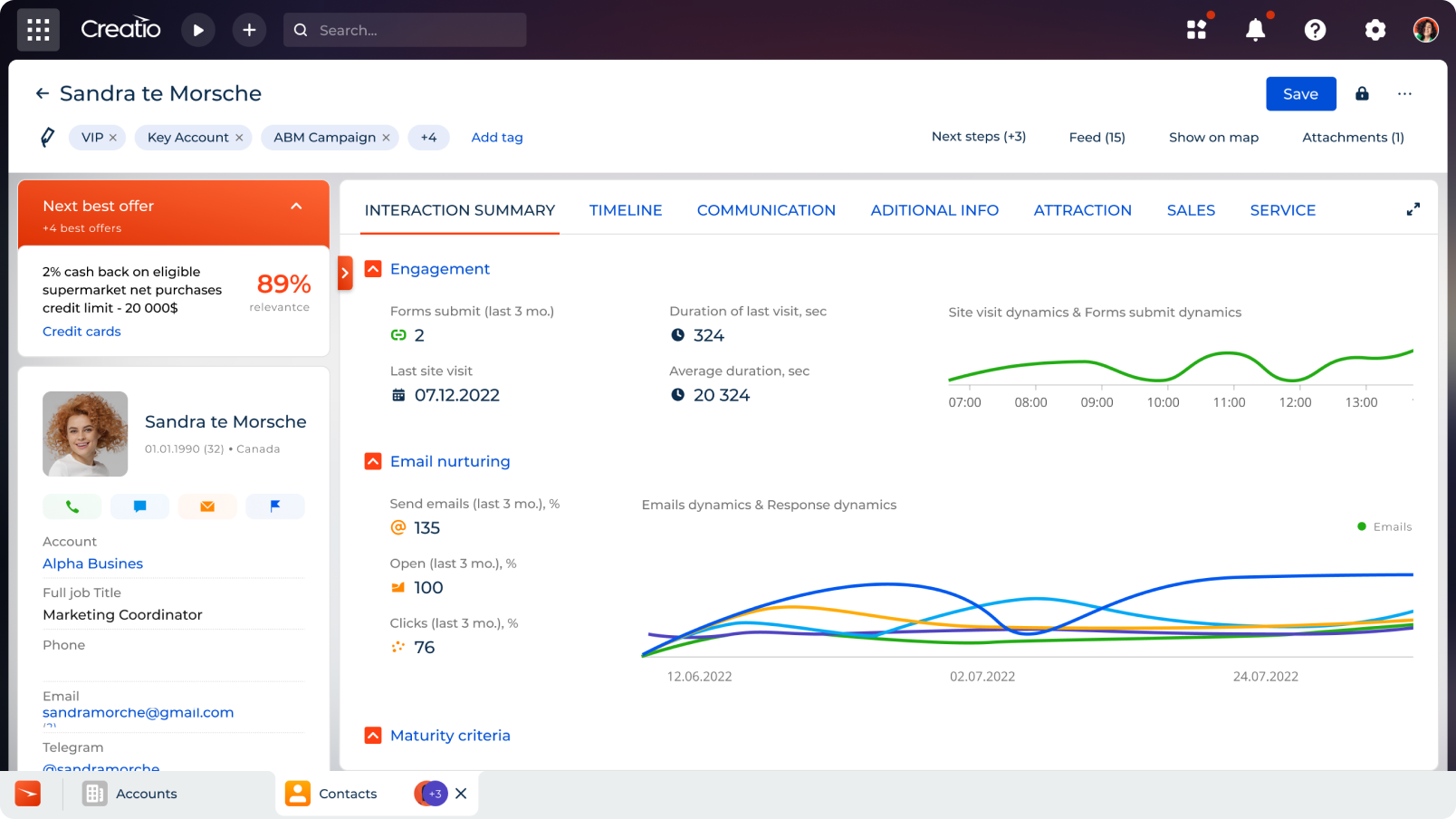
Customer 360 view
One notable benefit of this CRM functionality is the ability to categorize contacts and accounts. Users can segment their customers based on various criteria, such as industry, location, purchasing behavior, etc. Moreover, this feature facilitates efficient communication with clients by helping manage all their interactions with businesses and making sure no customer interaction slips through the cracks.
Lead & opportunity management
Lead and opportunity management is a pivotal CRM feature, designed to drive conversions and optimize sales performance. It automates and streamlines lead-to-revenue workflows, helps businesses guide leads through the whole sales process, and nurtures potential prospects into loyal customers.
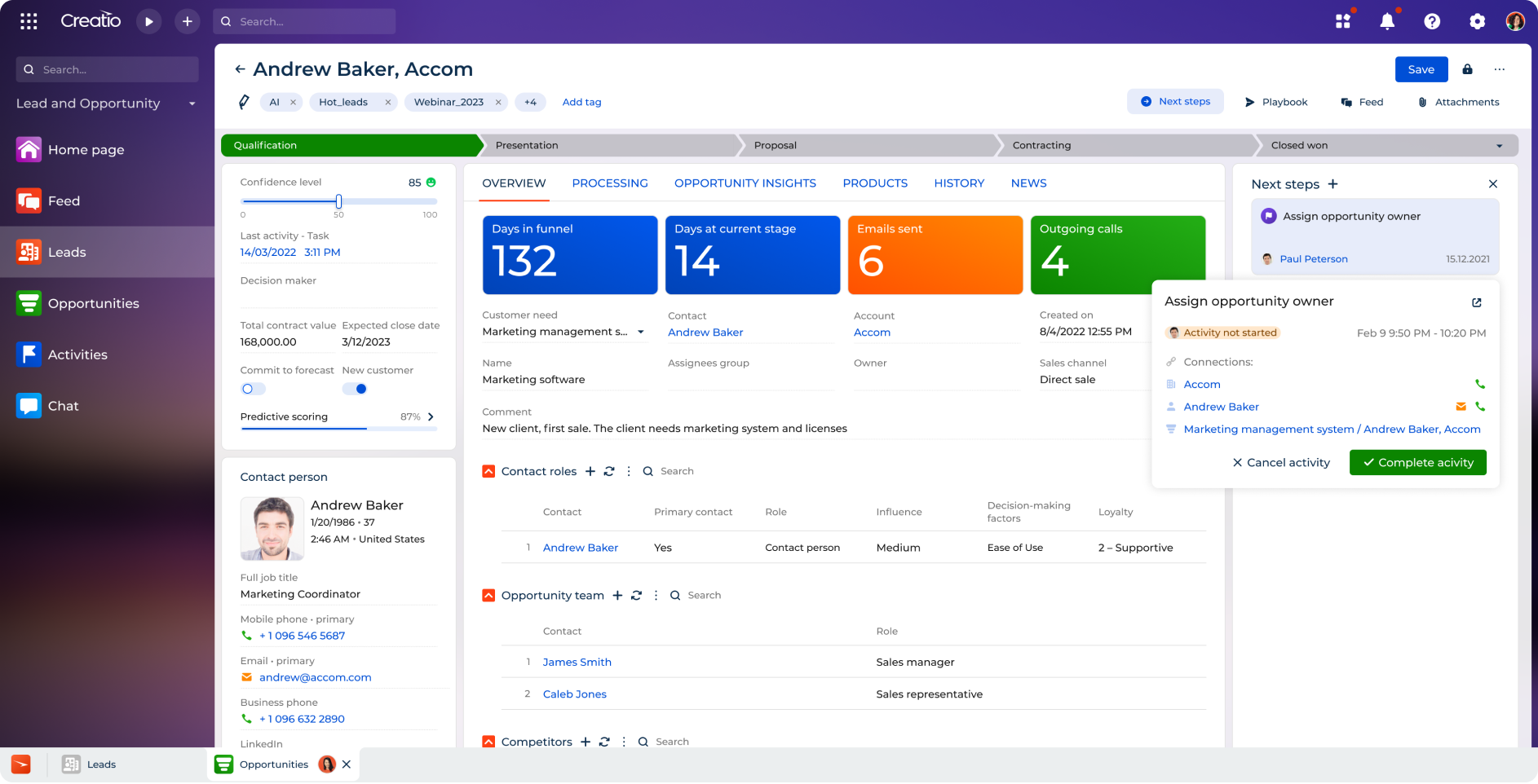
Lead and opportunity management
Lead management enables organizations to capture and organize information about leads coming from multiple sources. This includes details such as contact information, lead source, and the nature of the prospect's interest.
As leads progress through the sales funnel, the opportunity management feature helps transition leads into concrete opportunities by providing a framework for tracking and managing each stage of the sales process. The goal is to understand each prospect's specific needs and deliver support at every step of their purchasing journey with tailored content, demos, and proposals.
A key advantage of this feature is its ability to automate repetitive tasks associated with lead and opportunity management, such as lead capture, qualification, and segmentation based on predefined criteria, follow-up email scheduling, and status updates. By automating these tasks, businesses can ensure a consistent and timely approach to lead nurturing, allowing sales teams to focus on high-impact activities and improve their efficiency.
Pipeline management
Pipeline management provides organizations with tools to visualize, track, and optimize their sales processes. This feature is designed to give businesses a clear overview of their sales pipelines, from initial lead acquisition to the final closure of deals.
Pipeline management allows businesses to trace their sales stages, and define each stage of the sales process, from lead qualification to deal closure, tailoring the pipeline to their specific sales cycle. This visual representation ensures transparency and enables teams to quickly evaluate where each potential deal stands in the pipeline. Teams can also identify bottlenecks, analyze conversion rates, and gain insights into the efficiency of their sales processes.
Workflow automation
Workflow automation is a cornerstone feature in CRM systems, helping businesses enhance efficiency, reduce manual tasks, and optimize processes across various departments. This feature is designed to automate routine, repetitive tasks, allowing organizations to improve overall productivity.
Workflow automation feature caters to a wide range of business processes, from sales and marketing to customer service and internal operations. It’s about creating and optimizing the sequence of tasks and actions that make up business processes, following certain rules and logic. For example, onboarding a new customer can involve multiple steps, such as account creation, contract generation, service activation, etc., all automated within a single workflow.
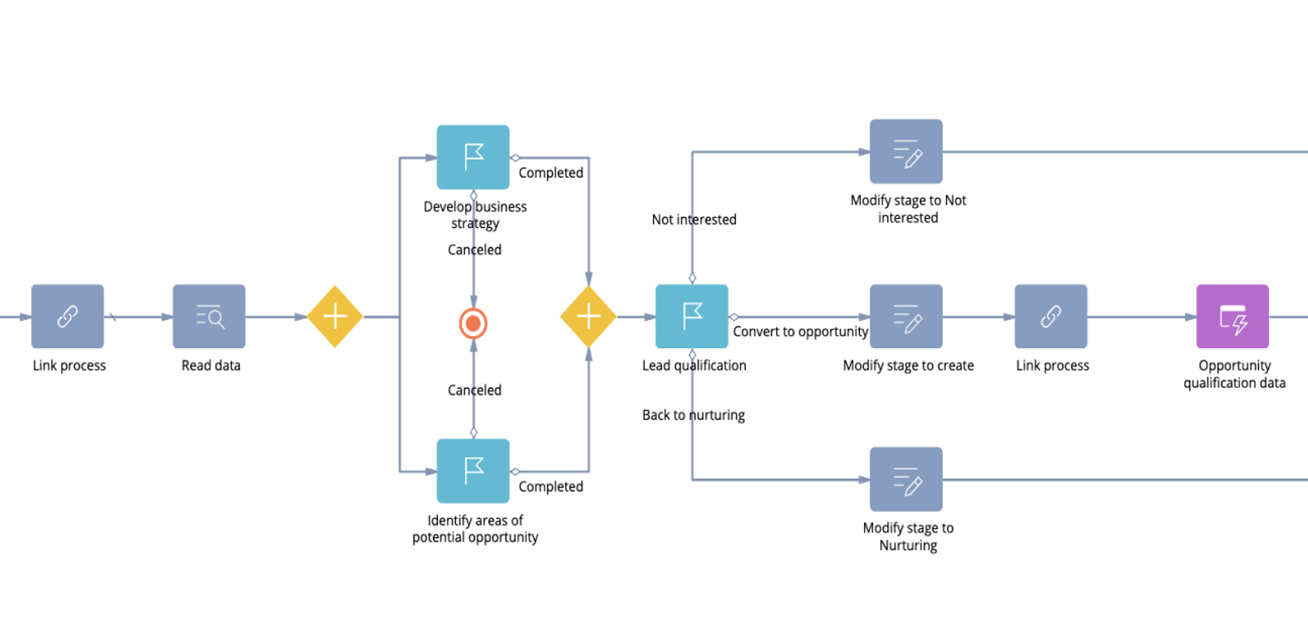
Sales workflow
Workflows can also be tailored to industry-specific processes. For example, in the banking industry, CRM can be used to automate workflows for loan application management, leveraging customer 360 data to provide personalized loan terms for each client, and streamlining the verification and approval process.
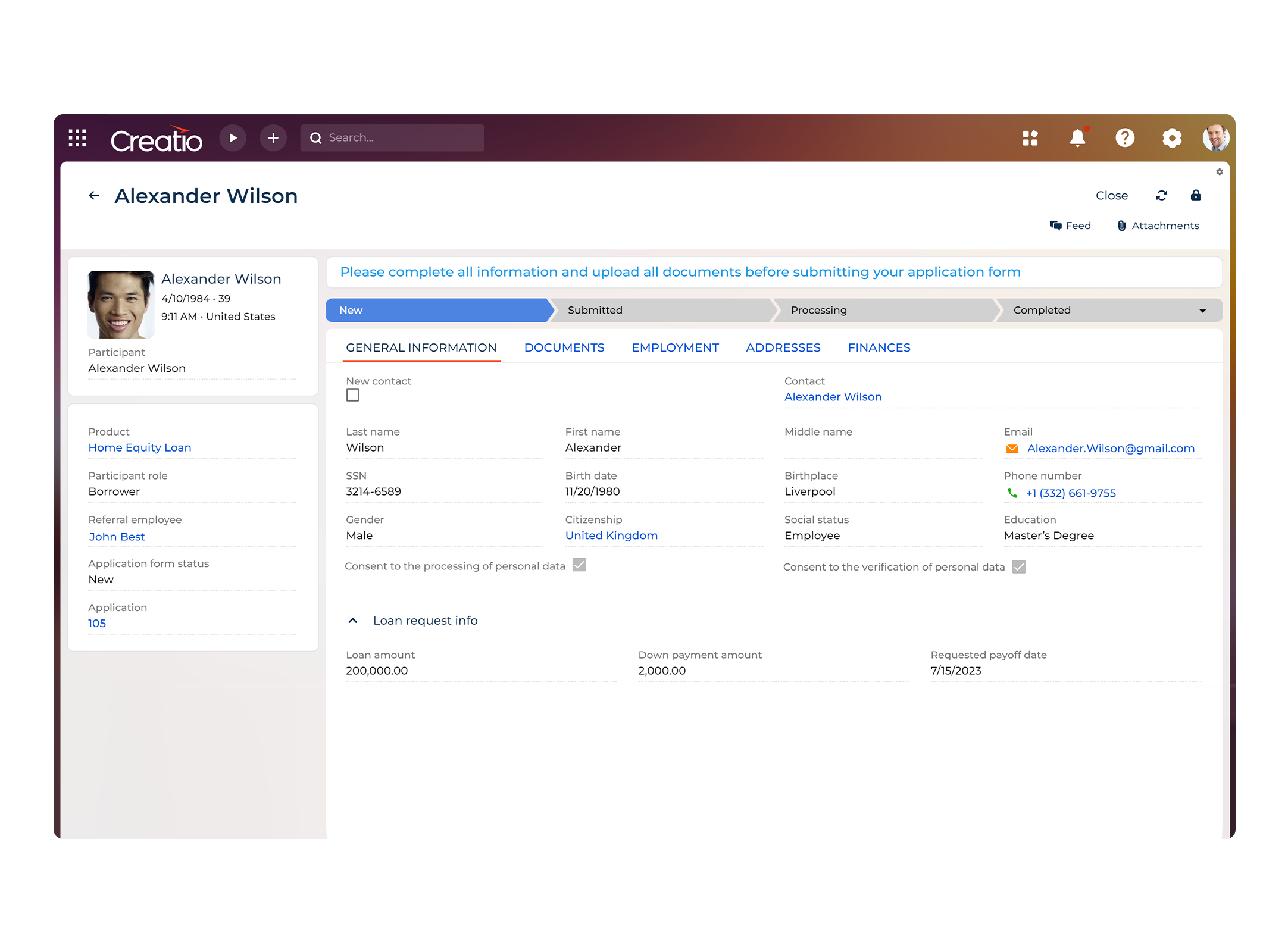
Loan application management
Orders, invoices & contracts
The CRM feature for order, invoice, and contract management provides businesses with a comprehensive toolset for managing transactions seamlessly from initiation to completion. CRM software helps create automated document management workflows, track current order status and history, and analyze order processing effectiveness.

Order and contract management
Starting with orders, this functionality allows businesses to effortlessly create, track, and manage customer orders. It streamlines the ordering process, ensuring accuracy and minimizing errors. By centralizing order information within the CRM system, teams can easily monitor order status, track inventory levels, and promptly address customer inquiries.
The invoices feature enables the generation, tracking, and management of invoices directly within the CRM system. The contracts component of this feature ensures that businesses can manage and monitor contractual agreements effortlessly.
Campaign management
Campaign management is a crucial feature for marketing teams, offering a set of tools to plan, execute, monitor, analyze, and optimize multichannel marketing campaigns. With this feature, marketing specialists can easily segment the target audience and design an automated marketing campaign to engage with prospects or customers through various channels (e.g., email, PPC campaigns, social media, etc.).
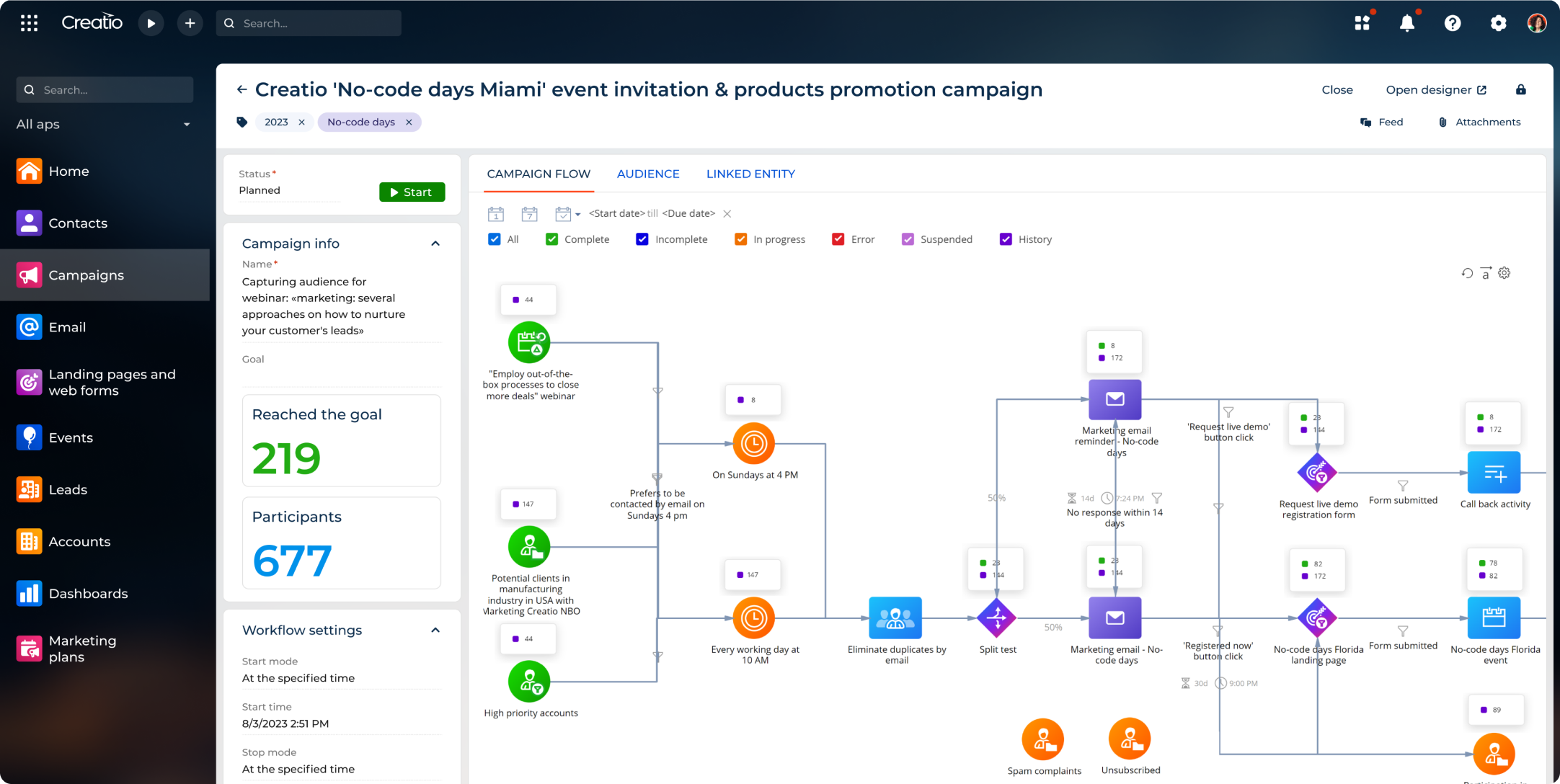
Campaign management
With campaign management, businesses can tailor campaigns based on customer segmentation derived from the CRM's contact and accounts management feature. This integration ensures that campaigns are not only well-targeted but also resonate with the preferences and behaviors of the target audience. Campaign management also supports automation, streamlining repetitive tasks such as email sends, lead scoring, and follow-ups.
An important aspect of this feature is analytics capabilities that help businesses measure the return on investment of their campaigns. Marketers can track key metrics such as conversion rates, click-through rates, and customer acquisition costs. They can also easily run A/B tests to experiment with different campaign elements, such as email subjects, visuals, or call-to-action buttons, and check their effectiveness. These insights help improve future campaigns, enabling a data-driven approach to marketing strategy.
Service management
Service management is a CRM feature designed to optimize and streamline customer service operations. It offers customer service teams a digital workspace to provide omnichannel customer service, effectively manage customers' requests, and automate service workflows in a single environment.
Service management helps with tracking and managing customer service requests. This feature facilitates customer support by automating routine tasks, such as ticket assignments, status updates, and follow-ups, ensuring that service teams can focus on resolving issues rather than managing administrative tasks.
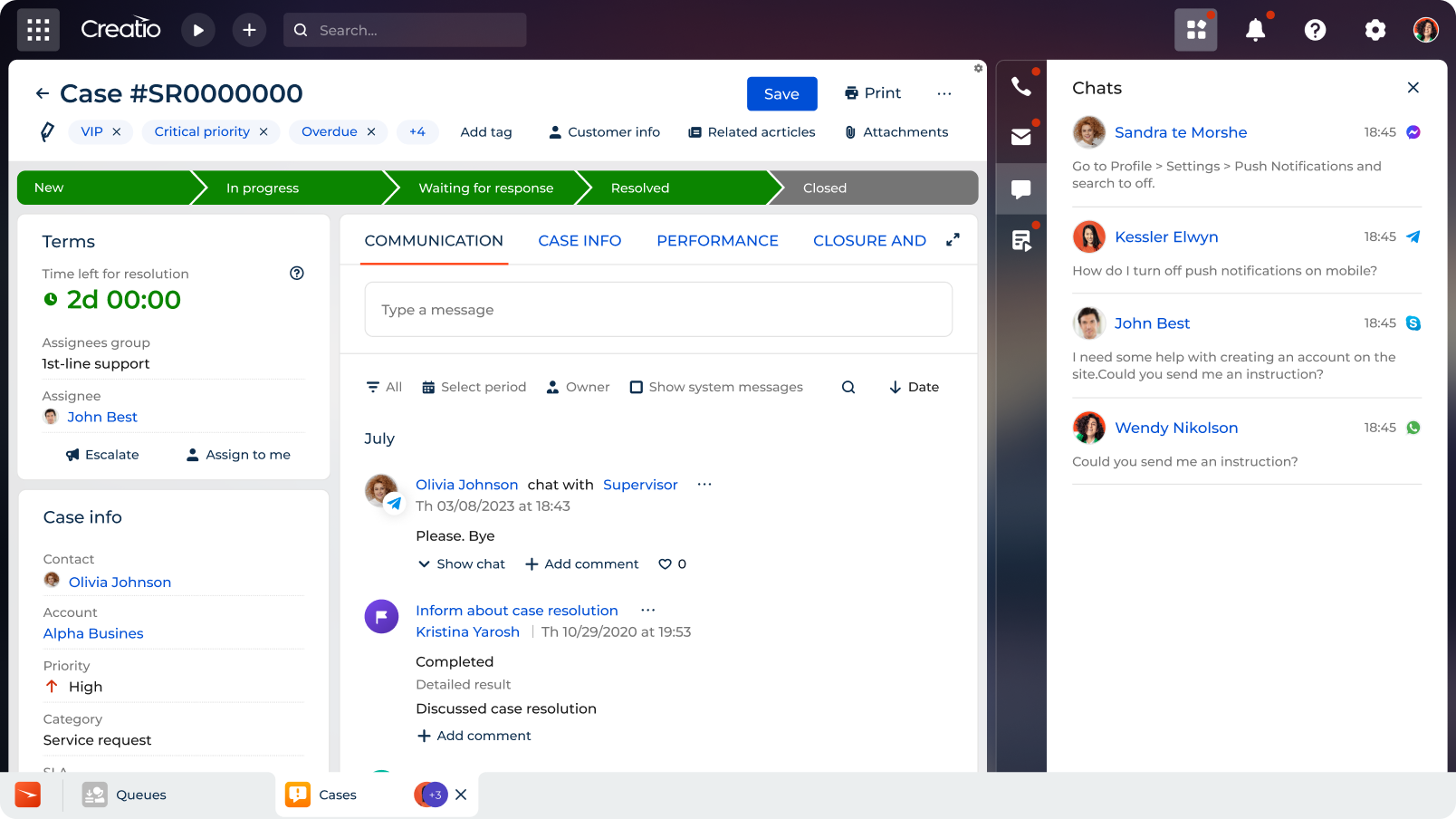
Case and service request management
Integration with other CRM features, such as contact and accounts management, allows service teams to access comprehensive customer profiles. This ensures that support agents have a full view of the customer's history, including past interactions, purchases, and preferences.
Dashboards & analytics
Comprehensive CRM solutions offer a robust set of features that help businesses gain insights into their operations. Users can create and customize dashboards to display crucial metrics like overall business performance, current sales funnel status, team KPIs, ROI of marketing campaigns, lead generation overviews, etc.
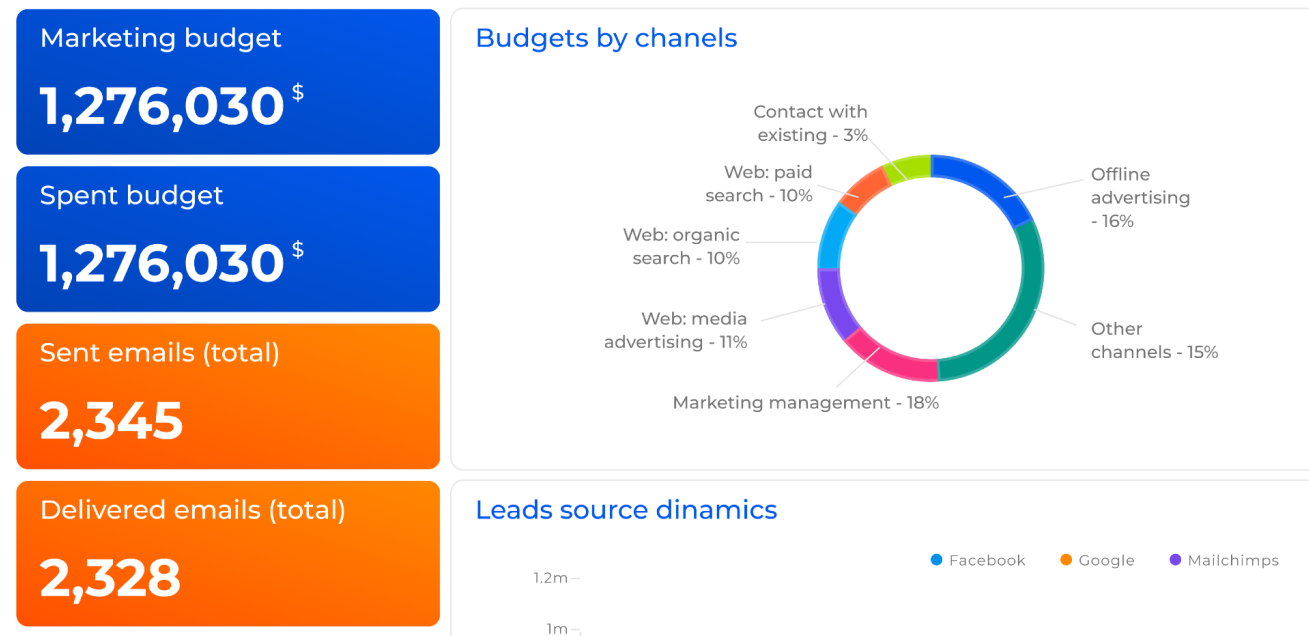
Marketing dashboard
Analytics within CRM systems plays a pivotal role in transforming raw data into actionable insights. By leveraging these insights, organizations can gain a deeper understanding of their sales processes and customer interactions to adapt their strategies, improve customer experience, and increase their revenue.
Collaboration
The collaboration feature fosters effective communication and cooperation among team members within an organization. This CRM feature provides a centralized workspace where team members can share information, insights, and updates in real-time.
Whether it's collaborating on a specific task, discussing sales strategies, or addressing customer service issues, this feature encourages transparent communication and helps teammates work together efficiently. Collaboration can also extend beyond internal teams to include external stakeholders, partners, etc.
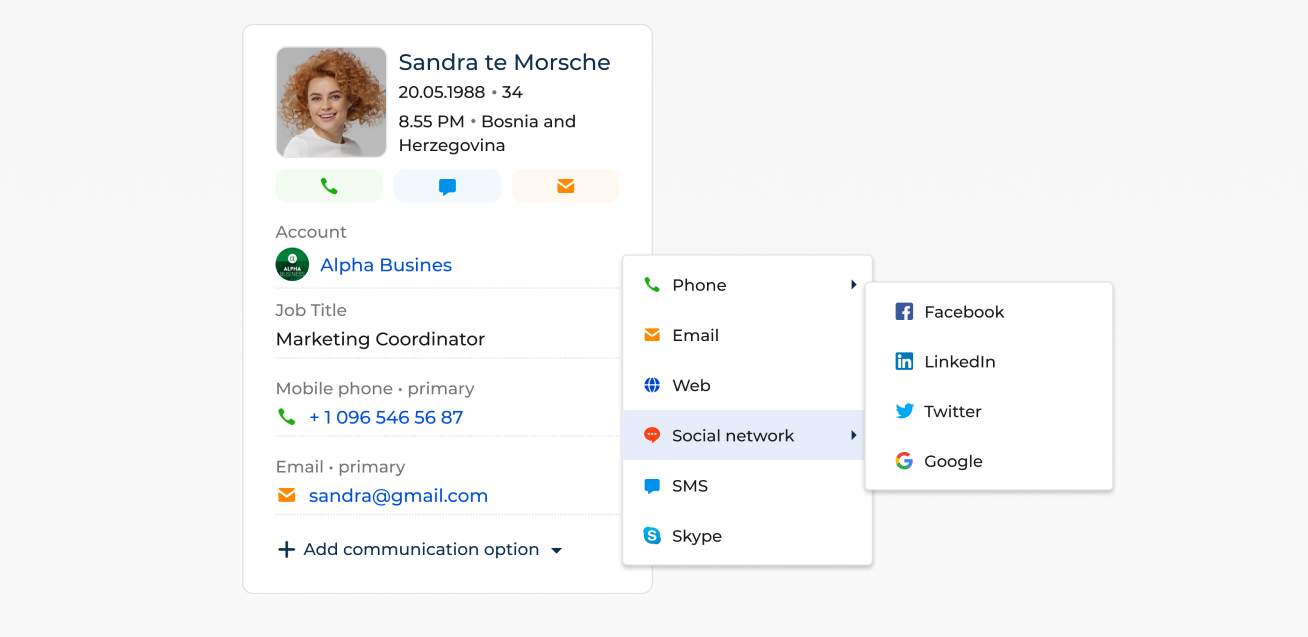
Omnichannel communication feature
AI/ML data models
Modern AI/ML technology supports automating workflows and building data-driven forecasts/recommendations for different use cases. This feature uses advanced algorithms to analyze datasets, extract meaningful patterns, and make intelligent predictions that empower businesses to anticipate customer needs and optimize their operations.
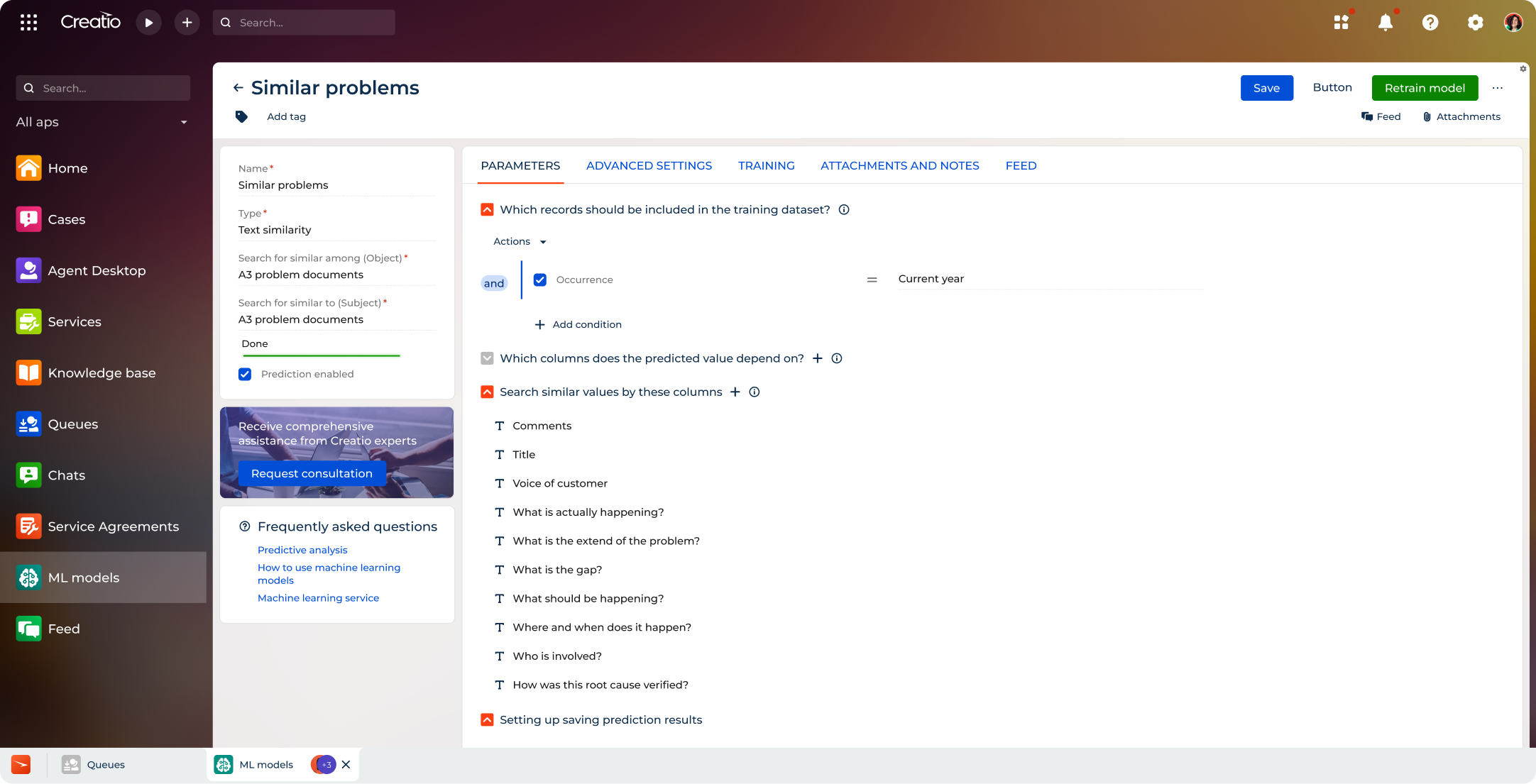
Generative AI and Machine Learning
Advanced CRM solutions provide AI-powered ML models of various types (classification, recommendation, segmentation, scoring, etc.) and vertical-specific data models, for example, a Next Best Offer feature for banks. By analyzing historical data, these models can identify correlations and patterns, providing insights into potential future outcomes.
Integration possibilities
Integration possibilities allow businesses to link their CRM system with countless third-party applications, from email marketing platforms and project management tools to accounting software and e-commerce platforms.
This ecosystem ensures seamless data flow across different systems, providing a comprehensive view of essential information. The flexibility of the integration feature guarantees that businesses can tailor their CRM system to suit their specific needs and workflows.
Task management
Task management is a key feature in CRM systems that empowers organizations to organize, prioritize, and streamline their workflows efficiently. This feature serves as a centralized hub where teams can create, assign, and track tasks, ensuring that everyone is aligned with organizational goals and responsibilities.
Teams can categorize tasks based on importance, or deadlines, allowing for a more organized and efficient approach to daily operations. For example, high-priority tasks related to closing a deal or resolving a customer issue can be easily identified and addressed promptly.
Sales forecasting
Sales forecasting provides businesses with the ability to predict future sales based on historical data, current trends, and real-time insights. This feature helps organizations make informed decisions, allocate resources, and set realistic goals.
CRM software leverages historical sales data to identify patterns and trends. By analyzing past performance, teams can gain valuable insights into the factors that influence sales, such as seasonality, market trends, or the effectiveness of specific campaigns.
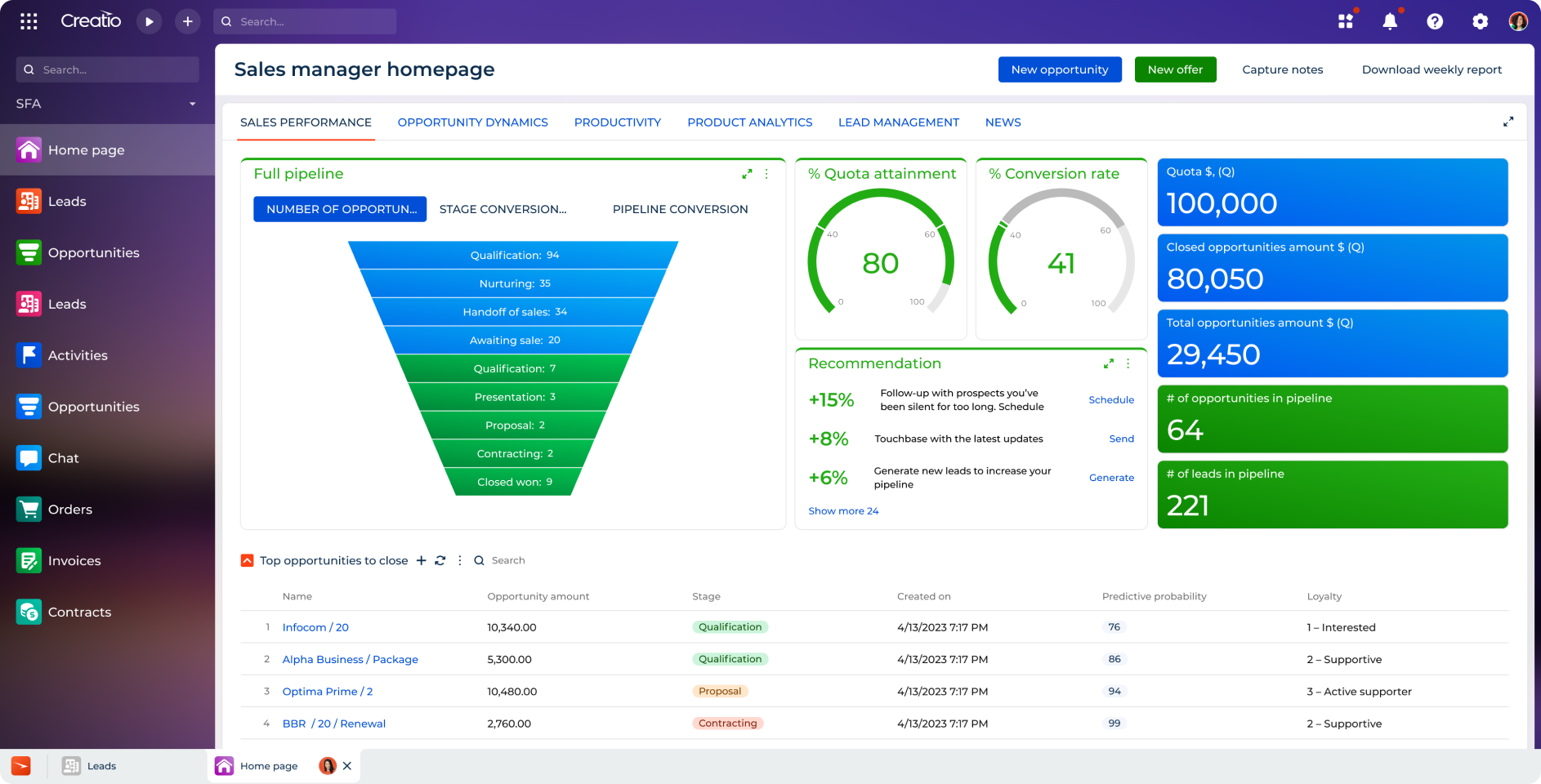
Sales forecasting
Integration with other CRM features, including pipeline management and AI/ML data models, can further enhance the accuracy and granularity of sales forecasts.
Field sales management
If your sales representatives work in the field, you need a robust field sales management feature, equipped with the tools to effectively coordinate, and optimize their efforts. A mobile application enables your sales team members to quickly pull up customer profile details, contracts and orders, pricing information, or marketing materials, which can help ensure that the client's meeting goes smoothly.
Field sales management allows businesses to organize and assign sales territories to their field representatives. This ensures that each salesperson is responsible for a specific geographic area, maximizing efficiency and minimizing overlap, which is particularly valuable for businesses with diverse or extensive customer bases.
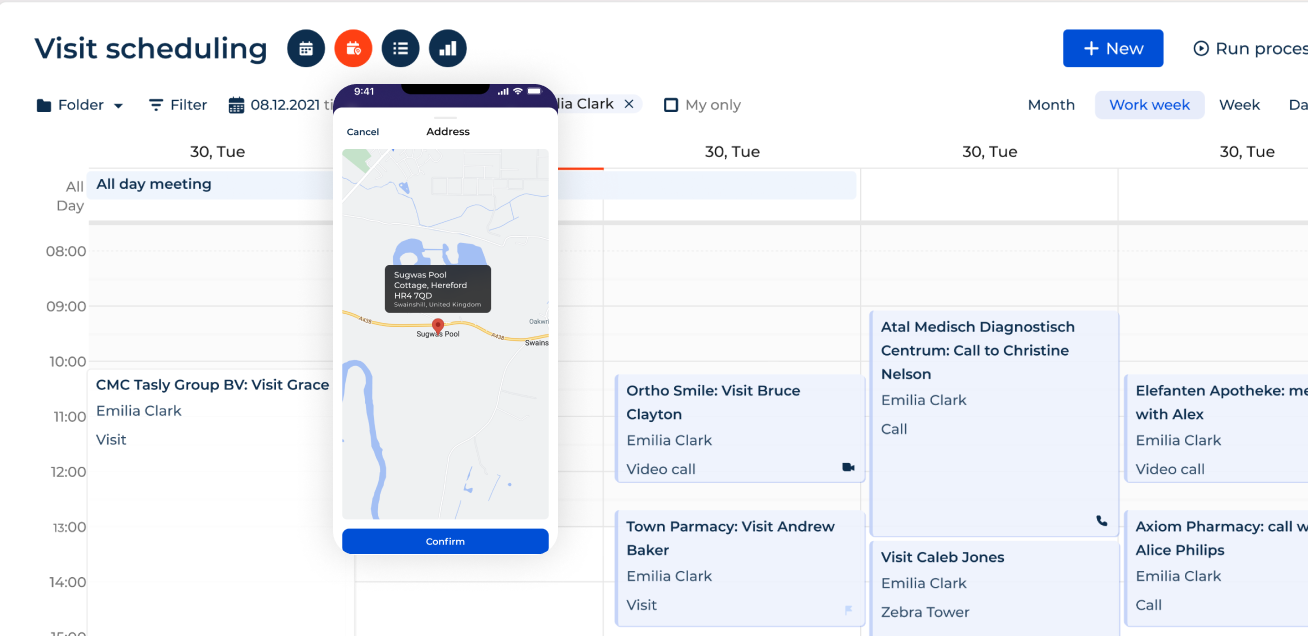
Field sales and service management
Moreover, this feature integrates with other CRM components, creating a seamless flow of information between field sales and central operations. For example, updates on client information, interactions, and orders recorded in the field are instantly reflected in the CRM system, providing real-time insights to the entire organization.
Mobile CRM
Mobile CRM offers flexibility to manage customer relationships, access crucial data, and stay connected on the go. This ensures that teams can seamlessly engage with the CRM system anytime, and anywhere, without being tied to a desktop.
Modern CRMs provide a mobile-friendly interface that allows users to access the full suite of CRM functionalities on smartphones or tablets. Whether in the field, during client meetings, or while traveling, team members can effortlessly view and update customer information, manage tasks, and stay connected with the latest developments.
Data security
Data security is a paramount feature for CRM systems, addressing the critical need to safeguard sensitive customer information and organizational data. In an era where cyber threats are around every corner, this feature ensures that businesses can trust their CRM systems to protect confidential information and maintain compliance.
Access control is a key aspect of data security, allowing organizations to define and regulate who can access specific data within the CRM system. Role-based access ensures that individuals have access only to the information necessary for their roles, preventing unauthorized users from viewing or manipulating sensitive data.
Compliance with Data Protection Regulations, such as GDPR (General Data Protection Regulation) or HIPAA (Health Insurance Portability and Accountability Act), is another integral aspect of data security. CRM systems incorporate features that allow organizations to adhere to these regulations, ensuring that customer data is handled responsibly, and privacy rights are respected.
Testing environments
Testing environments in CRM ensure seamless deployment, optimization, and continuous improvement of the system. This feature provides a controlled and isolated space where organizations can test updates, configurations, and integrations without impacting the live environment.
Testing environments offer a sandbox that mirrors the actual CRM. This allows organizations to replicate real-world scenarios, test new features, and assess the impact of changes in a controlled setting before deploying them to production. Teams can simulate the impact of changes on workflows, integrations, and data structures, identifying potential issues and addressing them.
Customization opportunities
Customization allows organizations to tailor the CRM system according to their unique needs, industry-specific requirements, and evolving business processes. This CRM feature ensures that the system is not a one-size-fits-all solution but a flexible and adaptable tool that can be tailored to the organization's goals.
Customization opportunities enable organizations to choose specific features, and modify fields, layouts, and workflows within the CRM system to tailor them to their needs, and preferences.
Another aspect of customization is the personalization of a User Interface. Teams can configure dashboards, reports, and views based on departmental needs and preferences. This ensures that users have a customized view of the CRM system, optimizing their efficiency.
Performance management
Performance management is a CRM functionality that involves tracking, analyzing, and improving key metrics and activities to enhance the overall efficiency and effectiveness of sales, service, and marketing processes. This feature provides valuable insights, allowing businesses to optimize their strategies, identify areas for improvement, and match their operations with organizational goals.
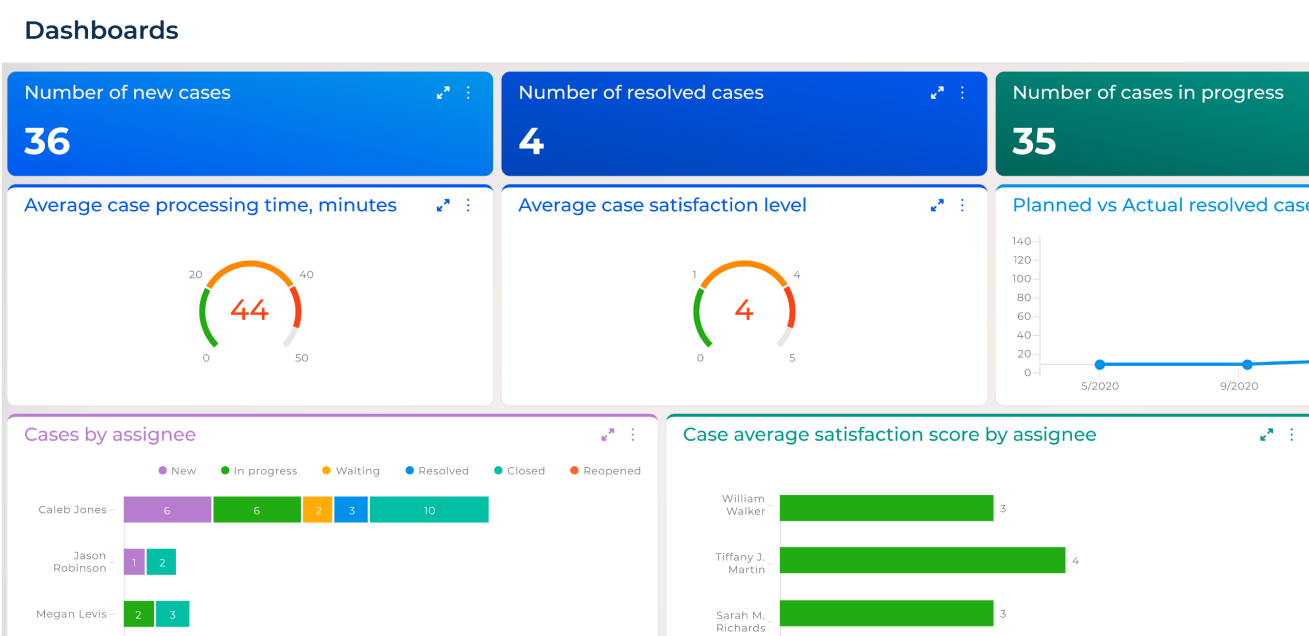
Service performance analytics
Performance management involves setting and monitoring Key Performance Indicators (KPIs) relevant to business activities. This includes metrics such as lead conversion rates, sales cycle length, customer satisfaction scores, and campaign revenue. By establishing clear performance benchmarks, organizations can measure the effectiveness of their efforts and implement improvements if necessary.
E-mail marketing
Email marketing is a CRM feature that helps businesses create, automate, and optimize email campaigns. Organizations can create personalized communication, improve engagement, and boost relationship-building with leads and customers through email channels. This feature integrates seamlessly with the CRM platform, allowing organizations to use customer data and relevant information like recent purchases, and interactions for personalized and effective email campaigns.
Businesses can easily segment their contacts based on various criteria to tailor emails to specific audience segments. Personalized email content ensures a customized experience thanks to using individual names, preferences, and relevant product recommendations.
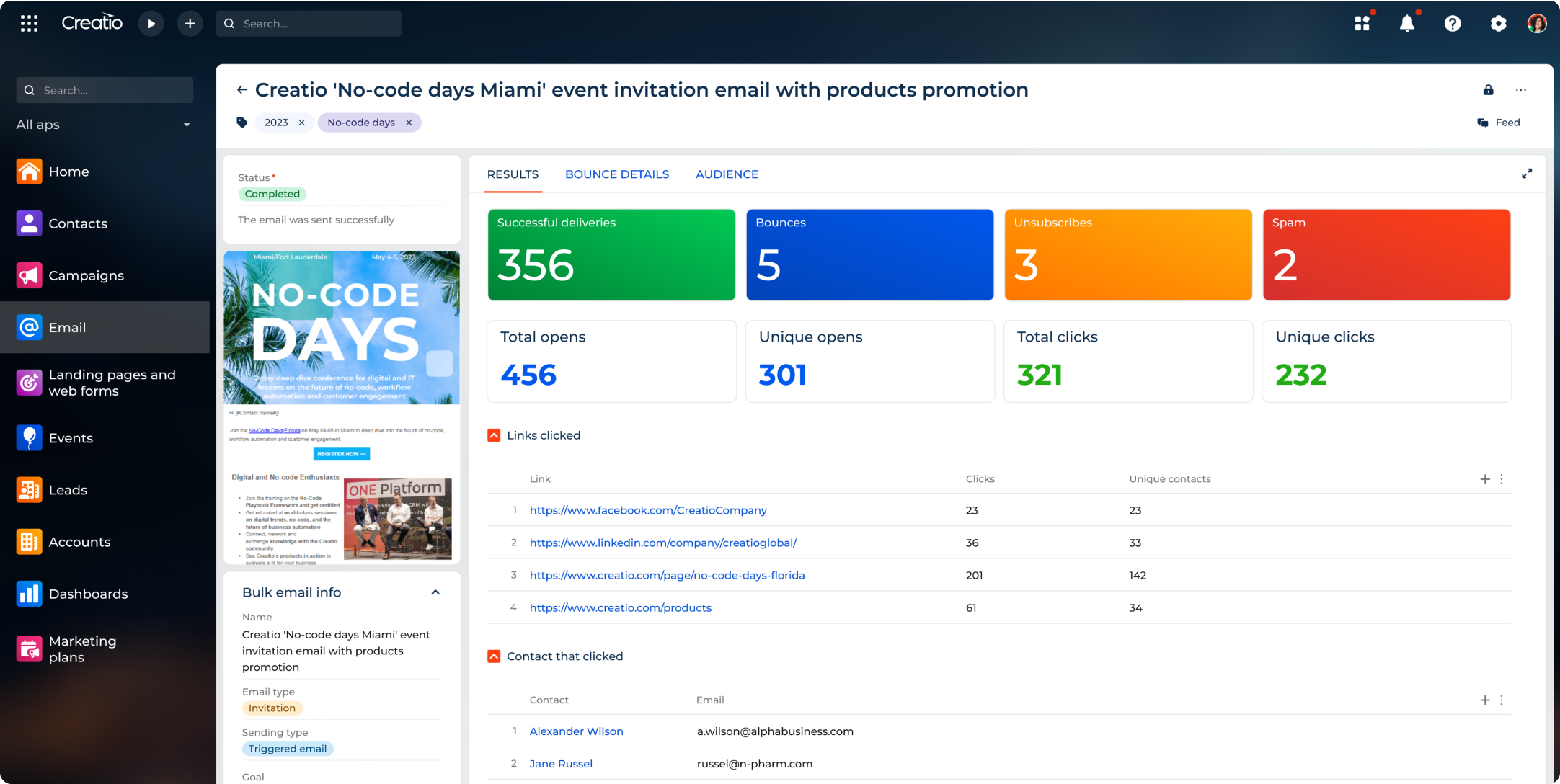
Email marketing feature
CRM systems streamline email workflows, facilitating the creation of automated campaigns triggered by specific events or customer actions. For example, an email series can be triggered, without manual work, after a user fills in a form embedded on a website. Email marketing can also help with lead nurturing, enabling organizations to guide leads through the sales funnel with targeted and timely emails.
Best CRM Vendors
Creatio
Creatio CRM is a comprehensive solution designed to elevate businesses in their customer relationship management activities. It offers a fully customizable solution empowered by its no-code platform Studio Creatio and three main CRM modules: Sales, Marketing, and Service.
Creatio offers a composable architecture that ensures exceptional customization and configuration capabilities. Businesses can tailor their solution to meet specific requirements, preferences, and use cases with drag-and-drop functionality and an extensive library of pre-built components and blocks. Organizations can also benefit from ready-to-use industry-specific workflows to further specialize their CRM and accelerate the system development process.
Creatio CRM encompasses countless features designed to elevate the efforts of sales, service, and marketing teams. From customer 360 to lead and opportunity management, campaign management, workflow management, order and contract management, and case management, Creatio provides a suite of tools essential for streamlining business operations and enhancing customer relationships. Moreover, the Creatio Marketplace enriches the CRM by offering a diverse collection of applications, add-ons, templates, connectors, and industry-specific solutions, enhancing, and extending the capabilities of the CRM system.
The pricing for each CRM module starts at $15 per user per month. The Studio Creatio platform costs between $25 for a Growth plan to $85 for an Unlimited plan, catering to the diverse needs of small and large businesses.
Salesforce
Salesforce CRM is cloud-based software that streamlines and automates business processes. It’s known for its feature-rich products, including Sales Cloud, Marketing Cloud, and Service Cloud, that assist businesses in prospecting, deal closure, and delivering customer service.
Salesforce integrates sales, marketing, service, commerce, and IT teams with its Customer 360 comprehensive suite of products, offering a unified view of customer information. It features an intuitive user interface, an extensive range of customization options available through low-code and no-code capabilities, robust AI-powered tools, and a large marketplace of third-party applications. This CRM offers, among other features, sales tracking and forecasting, lead management, mobile access, real-time insights, and custom reporting.
Salesforce offers 3 separate CRM solutions for sales, marketing, and service, each priced at $25 per user per month for the Starter Suite, and up to $330 per user per month for the Unlimited package. It also offers access to its advanced generative AI assistant Einstein for $500 per user per month. For small and growing businesses wanting to benefit from the basic capabilities of CRM for sales, marketing, and service, Salesforce offers a Starter Suite for $25 per user per month, and a Pro Suite with more flexible tools for $100 per user per month.
Monday
Monday.com is not a typical CRM solution, but a cloud-based work management platform that assists users in creating and customizing boards and workflows for customer-related activities. However, it does offer a dedicated, ready-made sales platform, called monday sales CRM. It offers features like sales pipeline, contact and lead management, lead scoring, performance tracking, email sync and tracking, and post-sales management.
Monday CRM is an intuitive and easy-to-use CRM platform designed to streamline and automate sales processes. It’s a fully customizable, no-code solution that integrates with communication platforms and third-party apps, like Gmail, Slack, Excel, and Mailchimp, to name just a few. It offers hundreds of pre-built templates, custom automations with ready-to-use automation recipes, and workflows that facilitate efficient project management, task tracking, and communication.
Monday sales CRM pricing starts at €12 per user per month (3 users minimum) for a Basic CRM plan. It also offers a Standard CRM for €17 and a Pro CRM plan for €28 for businesses needing a more comprehensive solution.
Microsoft Dynamics
Microsoft Dynamics 365 is a renowned CRM platform that includes Dynamics 365 Marketing, Sales, Customer Service, Commerce, and Customer Insights. It helps businesses streamline operations, enhance customer experiences, and drive business growth with flexible and scalable solutions.
Microsoft Dynamics 365 integrates with other Microsoft products ensuring seamless data sharing. The CRM platform offers a set of features such as sales process automation, lead management, predictive analytics, content management, account-based email marketing, and more. The platform is equipped with low-code capabilities, top-notch AI functionality, advanced reporting and analytics, customizable workflows, and a vast marketplace of applications.
Dynamics 365 pricing model is complicated. The Business Central Essentials plan starts at €65.50 per user/month and the Business Central Premium plan at €93.60 per user/month. However, some other options and add-ons can significantly increase the price of the complete product.
Why Do You Need CRM Software?
The implementation of CRM software is not just a technological choice but a strategic investment in the long-term success and growth of a modern business. By centralizing customer data and streamlining processes, CRM enhances customer relationships, boosts sales performance, and fuels efficient marketing campaigns. Its data-driven insights empower informed decision-making while fostering collaboration across teams.
CRM ensures proactive customer engagement, improving their satisfaction and retention.
With automation, businesses achieve operational efficiency and adaptability to evolving market demands. Ultimately, CRM is the cornerstone of modern business success, offering a comprehensive solution to meet the dynamic needs of today's enterprises.






